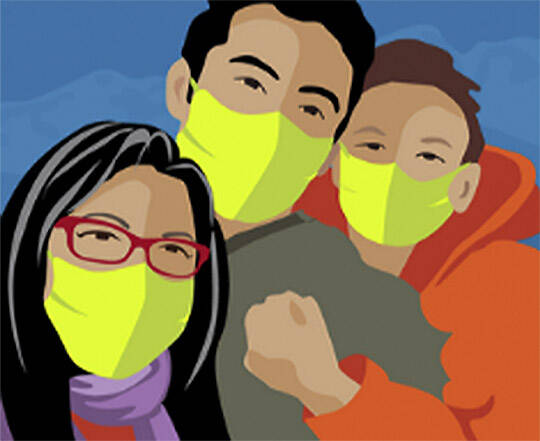Masking requirements due to COVID concerns in health care settings end April 3, but Kitsap Public Health District health officer Dr. Gib Morrow doesn’t really recommend doing that in some cases.
At the KPHD meeting March 7, Morrow said healthcare employees who work with the most-vulnerable senior populations should still consider wearing masks. “You put them at risk unmasking in those settings,” he said. Morrow said he doesn’t foresee a large surge in COVID cases when the mask mandate ends, but reminded folks that the healthcare system itself is in recovery with many shortages of workers. “Think long and hard about this” (unmasking), he said.
KPHD board chair and County Commissioner Rob Gelder said the shift in who pays the cost for COVID treatment is his concern, as government funding is drying up May 11. “Ability to pay” for some could be a challenge, he said.
Without government funding, Morrow said KPHD and other health care providers “certainly can’t continue local measures” that have been in place. The county’s latest statistics show COVID has dropped to 59 cases per 100,000, taking up just 6% of hospital beds. “It was a public health success story in many ways,” Morrow said.
Health assessment
In December the KPHD started working on a healthcare needs assessment. Board member and Poulsbo mayor Becky Erickson is hopeful they will get some data to help come up with solutions to health care shortages in Kitsap County. “It’s hard to get into a hospital and get medical services in Kitsap County,” she said, adding there are also shortages in long-term and mental health care.
Strategic plan
Siri Kushner, assistant community health director, showed during a PowerPoint presentation that the plan was delayed about two years due to COVID. There are six initiatives that show a proactive path forward in decision-making, rather than being reactive. They assessed 2021 compared with 2022 and made progress in each initiative.
Kushner said some of the successes included a healthy eating project, a new epidemiologist, family partnerships, a vaccination project, they sought health services funding, and they provided school safety inspections, and passed laws on vapor products and drinking water. This month KPHD and community leaders will make action plans.
M pox
Formerly called monkeypox nationally, KPHD changed the name because they thought it was insensitive. There were 681 cases and 18 hospitalizations statewide. Patients were men who had sex with men. Challenges included a long incubation period, 3-21 days, so it was tough to know when exposure occurred. KPHD provided case and contact investigations. Kitsap had five cases of Mpox with 18 close contacts; 11 went through the series of vaccinations.
Communications
Tad Sooter talked about his role of providing people with information they need to take care of their health. He said the KPHD has to be first, be right, be credible, express empathy, promote action and show respect. He said with situations like Mpox it’s important to work with partners who are already connected to specific populations and not to add to the stigma.
Lessons learned
Yolanda Fong, director of Community Health, said the back-to-back responses to COVID and then Mpox are something they will analyze.
“We need to shorten up the time to get the message out,” she said, adding evaluations of the response need to be action items “rather than being put on the shelf.” She added that she likes to “fine tune where you’re successful,” not just the gaps where they fall short. “We want to see where we’re strong and keep the momentum going.”
Morrow said interagency connections are important because it can be “blurry what public health and what health care does.” Funding also is an issue. “Public health is defunded and underfunded” with an archaic reimbursement system, he said.
Fong said another lesson learned is “to meet people where they’re at,” especially vulnerable communities.
KPHD board member Steve Kutz added that he learned people “can’t rely on their traditional primary care person.” They often don’t have the training for new emergencies like COVID and Mpox. “That’s where pubic health” and non-traditional responses come in.
Child death panel
KPHD administrator Keith Grellner said that it is starting a Child Death Review Panel. The goal is to prevent child mortality. By gathering data it hopes to understand risks and be able to share protective measures the public can take.



